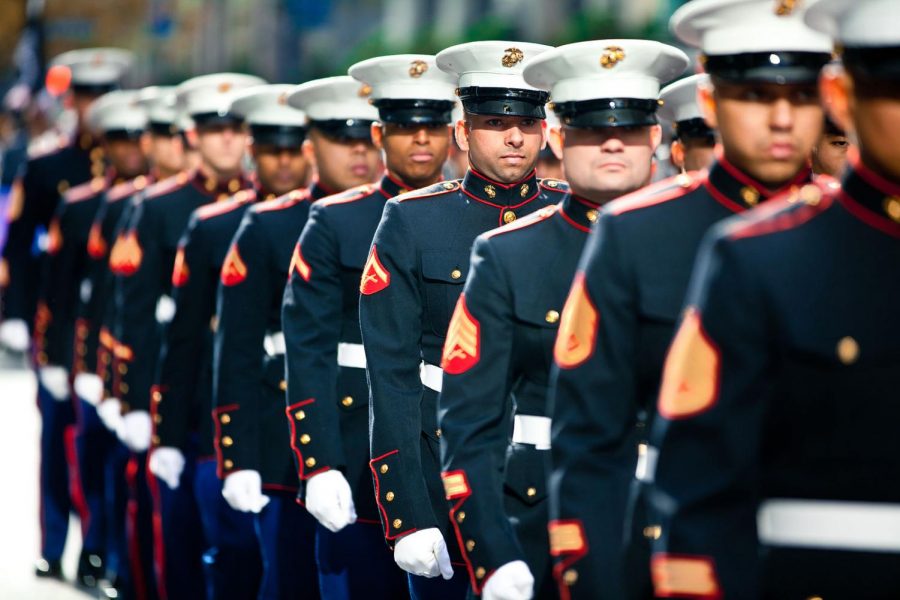Opinion: Veterans Day underscores urgency of addressing military food insecurity
The federal government must repeal irrational barriers to food assistance amid the crisis of military food insecurity.
Soldiers paraded around New York City on Veteran’s Day. The issue of food insecurity among military families is prominent and concerning. (Image via Wikimedia Commons)
November 17, 2021
Last Thursday, Nov. 11, commemorations for Veterans Day swept across the country. For the first time in two years, NYC’s Veterans Day Parade returned in full flair, flooding Fifth Avenue with marching bands, floats and vintage cars. Ceremonies were hosted across the nation to mark the occasion.
Behind such celebrations, however, lies a serious cause for concern — the growing crisis of food insecurity for military families. The pandemic has only exacerbated this issue. Prior to COVID-19, the proportion of food insecure military families had been one in eight — a figure that has now jumped to one in five. Furthermore, despite America’s consistent ranking as the top nation for military spending globally, up to 160,000 service members currently struggle to feed their families.
The principal causes behind such rampant food insecurity vary from low household income to the financial burdens incurred by military station relocations. However, there is one particularly egregious governmental policy that exacerbates this problem more than any other factor. The U.S. Department of Agriculture’s 2008 Food and Nutrition Act excludes thousands of military families in need from accessing food stamps. In moving forward with a governmental plan to address this insecurity crisis, several components — from uplifting dialogue to combat the social stigma around acceptance of government support, to the establishment of a basic needs allowance — are crucial. However, these solutions will do little until the government repeals the regulation gatekeeping critical food assistance.
The Food and Nutrition Act’s frequent exclusion of military families from Supplemental Nutrition Assistance Program (SNAP) government assistance is based on including the Basic Allowance for Housing — a stipend granted to families living off-base — as part of the income calculation in determining eligibility for SNAP benefits. Not only does this automatically exclude countless military families in need, it has no policy precedence or substantiated reasoning. This stipend is intended to cover the additional costs of living away from base stations, and does not count as income for tax purposes or alternate Women, Infants and Children benefits.
“I’m doing all I can and serving my country, and I have to worry about how I’m going to buy food?” California Marine Gabriel said to the Military Times on being forced to use food pantries to provide for his family. “We are protecting the Constitution of the United States, so shouldn’t the government make sure we can properly feed our families?”
This crisis is not only an issue of humanitarian advocacy — it poses a direct threat to national security, as food insecurity is likely to affect officers’ field performance, re-enlistment rates and generational attitudes towards military service.
“We’re the mightiest military on the face of the earth and yet those who are on the lower rung of our military ranks are — if they are married and have a child or two — they’re hungry,” Retired Army National Guard lieutenant colonel and Iraq War combat veteran Sen. Tammy Duckworth (D-IL) said to New York One. “How can you focus on carrying out the mission and defending our democracy if you’re worried about whether or not your kid gets dinner tonight?”
Since this year’s Veterans Day celebrations have come to a close, America must keep in mind what it truly means to honor those who commit their lives to national service and security. Ensuring basic economic security and sustenance for members’ families should be the minimum, but this remains impossible until the government removes the illogical barriers to critical food assistance and expands military eligibility for SNAP food stamps.
Contact Michelle Han at [email protected].




























































































































































